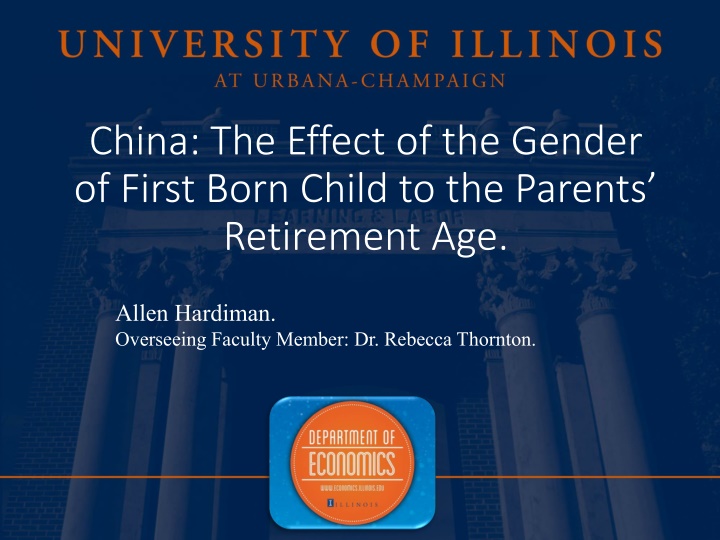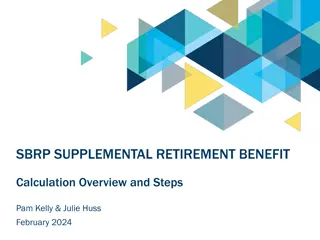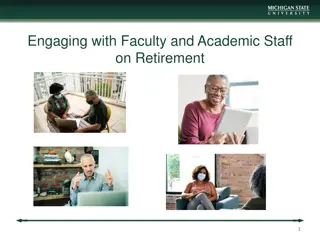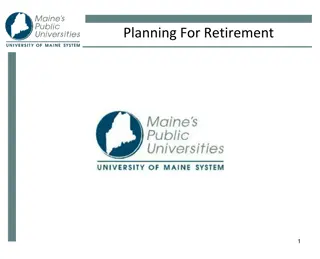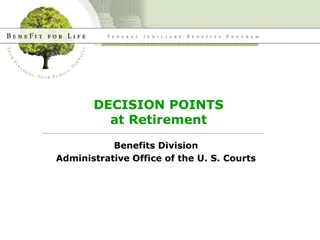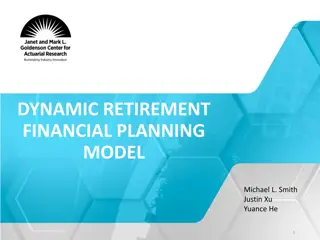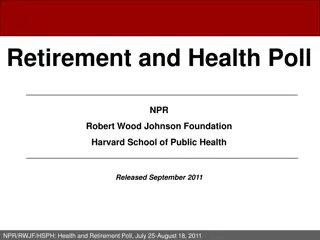Impact of Gender of First-Born Child on Parents' Retirement Age in China
The study explores the correlation between the gender of the first-born child and its impact on the retirement age of parents in China. With a focus on the societal norms influenced by the One Child Policy, the research delves into the gender discrimination and its effects, especially with a strong preference for male children in a patriarchal society. Through data analysis and empirical methods, the study aims to answer whether having a male first-born child leads to a reduction in the retirement age of parents.
Download Presentation

Please find below an Image/Link to download the presentation.
The content on the website is provided AS IS for your information and personal use only. It may not be sold, licensed, or shared on other websites without obtaining consent from the author.If you encounter any issues during the download, it is possible that the publisher has removed the file from their server.
You are allowed to download the files provided on this website for personal or commercial use, subject to the condition that they are used lawfully. All files are the property of their respective owners.
The content on the website is provided AS IS for your information and personal use only. It may not be sold, licensed, or shared on other websites without obtaining consent from the author.
E N D
Presentation Transcript
China: The Effect of the Gender of First Born Child to the Parents Retirement Age. Allen Hardiman. Overseeing Faculty Member: Dr. Rebecca Thornton.
Background One Child Policy in 1979 -> Child Gender Discrimination Strong Son Preference -> Patrilineal and Patriarchal society. Male child= main inheritors of family s assets. SRB ratio reaches 120.7 in 2000. Number is staggeringly high (191.3) if the first child is a female (World Bank). Male children are given preference on education.
Literature Search Research has shown that the strict enforcement of the one-child policy led to 4.4 extra boys per 100 girls in the 1980s, accounting for about 94% of the total increase in sex ratios during this period using the 1990 Census (Li, H., Yi, J., & Zhang, 2011).
Research Question Research question: Does a male first born child reduce the retirement age of its parents?
Theoretical Framework/Theory Raising a child is an insurance for old age culture Male child->more educational attainment-> better career-> more income-> Transfer more money to parents->parents retire early.
Data China Health and Retirement Longitudinal Survey. 17,500 individuals and 10,000 households in 150 counties/districts and 450 villages/resident committees. Wave 1 Survey in 2011.
Empirics/Methodology Sample: 3,151 adults who only have one child. 2,022 in the treatment group (have a male child) and 1,129 in the control group (have a female child).
Table 1 Summary Statistics Variables All Treatment Control Difference (3) (4) (1) (2) Age 54.425 [0.159] 0.485 [0.009] 0.390 [.009] 0.083 [0.005] 3.480 [0.036] 389.391 [72.015] 0.152 [0.006] 0.049 [0.004] 0.040 [0.003] 0.205 [0.007] 0.074 [0.005] 0.409 [0.009] 3.734 [0.014] 0.714 [0.008] 3,151 54.467 [0.203] 0.487 [0.011] 0.425 [0.011] 0.082 [0.006] 3.516 [0.045] 401.444 [102.125] 0.155 [0.008] 0.049 [0.005] 0.039 [0.004] 0.210 [0.009] 0.073 [0.006] 0.411 [0.011] 3.726 [0.018] 0.686 [.010] 2,022 54.350 [0.253] 0.481 [0.015] 0.328 [0.014] 0.084 [0.008] 3.416 [0.061] 367.806 [83.388] 0.148 [0.010] 0.048 [0.006] 0.041 [0.006] 0.194 [0.012] 0.076 [0.008] 0.406 [0.014] 3.750 [0.023] 0.764 [0.013] 1,129 0.117 [0.331] 0.006 [-0.004] 0.098*** [0.018] 0.002 [0.010] 0.100 [0.075] 33.638 [150.211] 0.007 [0.013] 0.001 [0.008] -0.002 [0.007] 0.016 [0.015] -0.003 [0.010] 0.005 [0.018] -0.025 [0.030] -0.077*** [0.017] Male Rural Ever had lung disease Number of days/week with at least 10 minutes of physical activity Hospitalization out-of-pocket expenditure last year Visited doctor/outpatient last month Ever had kidney disease Ever had liver disease Ever had some stomach/digestive disease Had any hospital stay last year Difficulty jogging/walking 1 km Self report of health**** Completed at least primary school Observation Notes: The sample is 3151 individuals that have only one child. Column 1 represents the total mean and standard deviation of each variables. Column 2 and 3 represents the mean and standard deviation in the treatment and control group. Column 4 is the difference between the mean in the treatment and control group. Standard errors in brackets *** p<0.01, ** p<0.05, * p<0.1 **** Self report of health indication: 1. Excellent 2. Very Good 3. Good 4. Fair 5. Poor
Regression Equation Retire= + 1*Malefirstbornchild+ Retire= + 1*Malefirstbornchild+ 2*At least primary school+ 3*Lung Disease+ 4*Kidney Disease + 5*Liver Disease + 6*Rural
Regression Result (1) (2) VARIABLES Retire Retire -0.0999*** [0.0146] -0.0665*** [0.0137] Male first born child(T) 0.114*** [0.0152] 0.0532** [0.0241] 0.00654 [0.0307] 0.0855** [0.0338] -0.249*** [0.0141] 0.254*** [0.0178] Completed at least primary education Ever had lung disease Ever had kidney disease Ever had liver disease Rural Constant 0.267*** [0.0117] Observations R-squared Standard errors in brackets *** p<0.01, ** p<0.05, * p<0.1 3,151 0.015 3,151 0.150
Results 26.7% of parents who have a female first born child are retired, compared to 16.7% of parents who have a male first born child-> a reduction of 10 percentage points. Controlling for other variables for potential bias, the reduction of percentage of retired is 6.65 percentage points. Parents with male first born child retire later. Goes against my hypothesis
Further Analysis (3) (4) (5) (1) (2) Live with child VARIABLES Any financial transfers from child Pension income Rural Completed at least primary education -0.0582*** 0.132*** -2,514*** [409.5] 0.0976*** [0.0180] 0.328*** [0.0145] -0.0771*** [0.0167] 0.764*** [0.0134] Male first born child (T) [0.0113] 0.143*** [0.0173] 0.588*** [0.0138] Constant 6,005*** [328.1] [0.00902] Observations 3,151 3,151 3,151 3,151 3,151 R-squared 0.008 0.018 0.012 0.009 0.007 Standard errors in brackets *** p<0.01, ** p<0.05, * p<0.1
Further Analysis 1. Only 8.4% of parents with male child receive any cash transfers, compared to 14.3% of parents with female child. 72% of parents with male child live together with their child, compared to only 58.8% of parents with female child. Parents with female child on average receive 2,514 yuan of pension income more compared to parents with male child. 42.5% of parents with male child live in rural area, compared to 32.8% of parents with female child. 68.6% of parents with male child completed at least primary education, compared to 76.4%. 2. 3. 4. 5.
Next Step Look up literatures about pension income, gender gap in occupation and wages, and parenting culture in China to gain more explanation about this result. Look up for threats to validity.
Works Cited Gender Gaps in China: Facts and Figures. (2006, October). Retrieved April 15, 2017, from http://siteresources.worldbank.org/INTEAPREGTOPGENDER/Resourc es/Gender-Gaps-Figures&Facts.pdf Li, H., Yi, J. & Zhang, J. Demography (2011) 48: 1535. doi:10.1007/s13524-011-0055-y
Possible Explanation Male children receive lower income-> larger percentage of co- residence for parents with male child-> lower retirement rate. Female children who are married lives with their husband-> lower percentage of co-residence-> no obligation to save money for their female child-> less tendency to work. Larger pension income for respondents with female child-> encourage them to retire.
